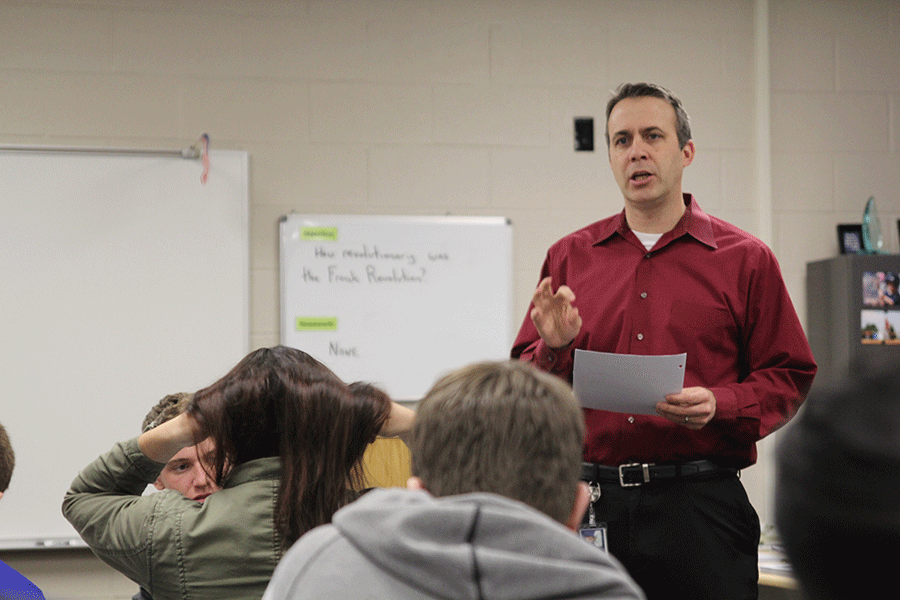Multidisciplinary Performance Task introduced into state testing for juniors
The MDPT will feature an essay response in which students will have an unlimited time to respond
Social studies teacher Jeff Wieland informs students of an upcoming debate in which students will analyze documents and discuss issues from past foreign policies on Friday, January 9.
February 23, 2015
One of the new state tests being issued this school year will require juniors to use application and analysis of documents to complete the first Multi Disciplinary Performance Task featured in Mill Valley to meet the Kansas Curricular College and Career Ready standards that have been implemented for the following school years.
Social studies teacher Jeff Wieland was interviewed for the committee which originally developed Kansas’ new social studies standards and was invited back recently to finish the test after they ran out of questions in previous years. Wieland has picked up on the past state testing scores, and elaborates on how the new MDPT will make students apply themselves more.
“If you look historically in the past decade at the kind of tests we administrated in Kansas, there has been a lull at the comprehension level. As much as they tried to make them harder, they were really about memorization and focusing on specific knowledge,” Wieland said. “It was inconsistent with the Kansas College and Career Ready Standards about what students can do rather than what they know, so the idea about developing the test is because when you deal out standards about ‘we want kids to do this’ then the tests don’t match the standards, the teachers are going to teach to the test.”
The new state tests will be monitored through the KITE system which was established by the Kansas Department of Education which is is contracted through the University of Kansas. School improvement specialist Leah Vomhof worked with Wieland and various other teachers from Mill Valley to create questions that will be able to be taught through common core by the teachers themselves.
“This is pretty real-world, when you sit in a class you are no longer just taking notes and then taking a multiple choice test,” Vomhof said. “You now have to read, interact with something, talk to somebody, process that and then end with written work to show your thoughts. We can’t recreate what will be in KITE, but we can give you the opportunities to interact with text.”
The MDPT for juniors include more rigorous concepts on applying knowledge yet have a new twist on the test format.
“The test will include either audio, video, or it could be a traditional printed document. So it will have a multimedia feel to it, but students within the system can take notes. They will actually be constructing a response and typing their essay into the computer,” Wieland said. “It’s very different in the format, once you move away from multiple choice, there is a lot more students will be able to do.”
Vomhof explains the break down of the two days which will consist of the MDPT out of the three test days.
“Day one of the MDPT offers a read-aloud feature so if you prefer to listen to text, you can have your earbuds in and listen,” Vomhof said. “Then during day two is when you are doing the real writing; you are taking notes and you are actually writing, it is where you will see your prompt again and see your resources from activity one, you review and then respond to the prompt.”
With the knowledge application opportunity expanding, the MDPT aligns closely with the ACT writing test, allowing students to apply their skills elsewhere.
“The topics are going to look more like the ACT writing test where they will look at things that might be familiar to high school students,” Wieland said. “Kids write on those issues rather than zeroing in on a specific piece of information. Kids will improve those ACT scores.”
The MDPT also offers more testing availability to students.
“Just to take the sections is three full class blocks, and these tests are untimed so if the student decided he were not done after three days, technically we have to keep doing it until they are done,” Wieland said. “There is a certain challenge with testing windows and the fair opportunity. Also the tests will just be harder for students, it requires the teachers to reevaluate how we are teaching kids to make sure we are doing things rather than just knowing things.”
Each student’s test block will run an estimated 50 minutes long. At the end of the third day, if a student has not completed their MDPT, the block will end but the student will be pulled out of their next class into another classroom where they will be expected to finish in a time-free zone again.
“This is a totally new way of taking an assessment,” Vomhof said. “We are going to take it as it comes, we can plan as much as possible for it, but we have to just see what happens.”
The following links have been provided for more state testing information:
The Kansas State Department of Education
Kansas College and Career Ready ELA Assessment










